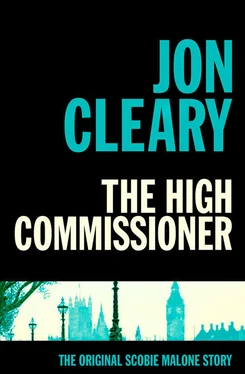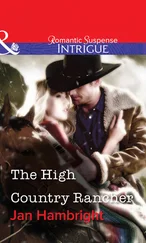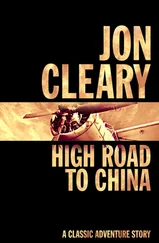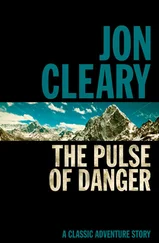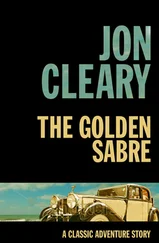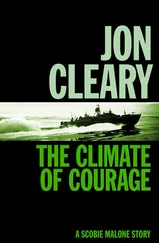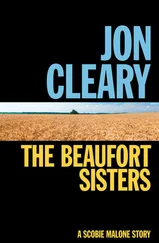Malone steered clear of any racial comment: he wasn’t sure that he was not being baited. “Do you work for him?”
“I’m like you, a guest here. The name is Jamaica.”
“You’re an American?”
Jamaica nodded. He might have been a handsome man had his face not been so tight : all his feeling towards the world was screwed in behind the closed defence of his face. The sculptured head, with its close-cropped hair and its stiff dark features, reminded one of a helmet with its visor down: all Jamaica’s pain, joy, hate and love would be his own secret.
“From Georgia.” His voice was softly accented, but he had been gone a long time from Georgia. “I haven’t seen you around before. Are you here just for the conference?”
Malone hesitated, then nodded. “I expect to be going back at the end of the week.”
“You think it’ll be finished by then?”
“Don’t you?” Malone added Russian salad to his plate, hoping it would not indict him in the eyes of the American.
Jamaica shrugged. He wore his evening clothes with less ease than had the African; his jacket was too large and when he shrugged one shoulder slipped forward a little, as if he had dislocated it. He’s like me , Malone thought, he’s wearing someone else’s tail plumes . “You know what conferences are like.”
“I don’t. This is my first.”
Jamaica picked up a stick of celery, bit into it. Across the room the journalists watched attentively, their stares hidden behind their champagne glasses. Their dress suits were less expensive than those worn by the other guests, but they wore them with as much ease; most of them were middle-aged or elderly men who had been on this round for years. Malone, a policeman with little affection for newspapermen, looked at them and thought of them as vultures dressed as penguins. But Jamaica ignored them; all his attention was on Malone. The celery crackled in his mouth as he said, “Your man Quentin is a great one for compromise, isn’t he?”
“You Americans don’t like compromise, do you?”
“It was a European invention.”
“You’re wrong there, mate. I think it was the Chinese.”
“The Chinese aren’t interested in compromise now.”
“That’s the only thing you have in common. You two ought to get together.” Stone the crows, I’m talking like a bloody diplomat; and Malone almost beamed with pleasure at his repartee. This was better than talking cricket scores and football results with the other blokes in the Murder Squad.
“You Australians aren’t in a position to be too independent.”
“No,” said Malone, his plate at last full. “That’s probably why Quentin is plumping for compromise.”
“You’d better be careful.” Jamaica’s voice was even, toneless: you could read into it any emphasis you wished. Malone read a warning, close to a threat; and turned his head sharply to ask Jamaica what he meant. But the American was already walking away. “I’ll see you around.”
Malone stared after him. Why was the American so sour, what did he mean that Malone should be careful? Then Malone was aware of someone moving along the supper table towards him.
Across the room one of the journalists had taken a step forward, but had stopped when he saw the small Oriental woman in the yellow ao dais moving towards the Australian.
“Who’s the woman?” the journalist whispered to one of his colleagues.
“Search me. But East is East and West is West—”
“Yes, I know. And quicker the twain should meet. But somehow I can’t see them going for a concubine down in Chislehurst. And that’s what she’d have to be. I already have a missus.”
“We’re backward here in Britain. We need a New Society.”
At the supper table Malone had turned as the woman spoke to him. “You are an Australian, I believe? Are you here for the conference?”
Out of the corner of his eye Malone saw that Jamaica had halted for a moment beyond the doorway and looked back. Had he warned Malone to be careful of this woman? If so, why? Malone looked down at the woman, tiny, beautiful, as dangerous-looking as a budgerigar.
“Sort of.” He had never become adept at looking at a woman while pretending to look elsewhere; he gazed frankly at this woman with the schoolgirl’s face. There was an innocence about her that seemed incongruous with the sophistication of the tight-fitting gown she wore. The ao dais exposed almost nothing of her but a shimmer of leg, yet it was more revealing than any other gown Malone had seen tonight. But the woman had not cheapened herself: what the gown hinted at was not for sale at bargain prices. “My name’s Malone. Pleased to meet you.”
“Pleased to meet you – I have never heard that greeting before. It is so much friendlier than How do you do. I am Madame Cholon.” Malone put out his free hand. After a moment’s hesitation Madame Cholon smiled and put her hand in his; it felt like the wing of a small bird and he pressed it with rough but gentle fingers. “You seem a very friendly man. One does not meet too many of those at receptions like this.”
“I’m new here. I’ll learn to be like the rest of them. Like something to eat?”
Eyed by the curious journalists, they moved out of the room on to a terrace that overlooked a large garden. Green lanterns bloomed in the trees and guests moved through the aqueous light like floating upright corpses. In the huge houses the chatter of the reception buzzed like the sound of a plague of summer night insects; the effect was heightened by the sultry warmth of the evening. Beyond the garden London was only a dull gold reflection on the low clouds, silent as a faraway eruption.
“This road used to be called Millionaires’ Row.” Madame Cholon pointed to the huge houses behind them, then to the mansions on either side. She picked with long-nailed fingers at a small bunch of grapes. “Then the embassies moved in here. Governments are the only ones with money these days.” Malone noticed the sharp blade of resentment in her soft high voice; this schoolgirl could be spiteful. “But then you are a government man, are you not?”
“None of the money filters down as far as me.”
“I have heard there is very little corruption in Australian government. Where I come from, a man is suspect if he is not corrupt.”
Malone, his mouth full of crab and salad, said nothing. He was ravenous, but he was doing his best not to look as if he were shovelling the food into himself.
“I like to see a man eat.” Madame Cholon bit delicately at a grape as if it were a mango. “Men are always more honest about the sensual pleasures, do you not think so?”
Malone gulped, clearing his mouth. “I hadn’t thought about it. Are they like that where you come from? Where do you come from?”
“Out East,” said Madame Cholon, and Malone remarked the evasiveness. He looked towards the doorway to see if Jamaica was still watching them, but the American had disappeared.
“That covers a lot of territory, Out East.”
“Yes, doesn’t it?” said Madame Cholon, and smiled. She ate another grape, spitting the seeds into her hand with something of the peasant coarseness that occasionally showed in her in the simpler body functions. She had seen this tall, socially awkward man arrive with the Australian High Commissioner and she wondered if he would he returning to Belgrave Square when Quentin returned there. Pallain, Pham Chinh and Truong Tho would want as few witnesses as possible when they killed Quentin.
“Do you gamble, Mr. Malone?”
Malone looked at her in surprise: he was finding it a little difficult to keep up with this woman. All the girls he had known had been straightforward, the sort that a confirmed bachelor preferred: you knew where you stood with them. “Once or twice a year I might have a quid on a horse.”
Читать дальше
